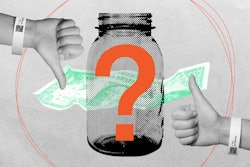
Language is ever-evolving, and event industry terms that were popular at one time can often seem out of date. (We're looking at you, "special events.") With this in mind, we asked readers what misused or outdated words annoy them the most when they hear clients, peers—or even BizBash editors!—using them. Here's what they had to say.
Party planner versus event producer:
“The terms party planner and event producer are often used interchangeably, but there can be some subtle differences in their connotations and scope of work,” explains Amanda Masick, director of marketing at Event Solutions, who outsourced ideas from her team for this story. “A party planner typically focuses on organizing and coordinating social gatherings and celebrations, such as birthday parties, weddings, or private events. An event producer, on the other hand, usually handles a broader range of events, which can include corporate events, conferences, trade shows, and large-scale productions. They take a more comprehensive approach to event planning and production.”
She continues, “As a company that does not produce social events and only focuses on corporate events, this is particularly a peeve for us when websites only give us an option for ‘party planner’ as a category.”
Heather Wilson, CEO and owner of consulting firm The Brand Strategy Tank, also cringes at words like party planner or even more tongue-in-cheek names like cat herder, cat wrangler, or event guru (the latter of which, she points out, reinforces negative cultural stereotypes). “Event professionals must know all areas of a business—law, contracts, product, marketing, content, budgets, and the list goes on,” she points out. “It seems reasonable to prefer names that convey this expertise, professionalism, and versatility. None of the above do that.”
Event planner versus event designer:
Masick also encourages differentiation between the terms event planner and designer. “An event planner is responsible for the logistics, coordination, and overall management of an event, including budgeting, vendor selection, and timeline management. An event designer, on the other hand, focuses on the creative elements of the event, such as theme development, decor, and aesthetics,” she says. “Many people expect that an event planner is all in one, but there are many people and roles involved in producing an event.”
Immersive and experiential:
“The event industry and clients can't seem to get enough of the word immersive,” says Alicia Jenelle, director of experiential event production at The Jenelle Group Inc. “It's everywhere, but, let's be real, it's getting old. It's lost its magic because everyone slaps it on everything, making it hard to tell what's truly immersive and what's just hype. We need to bring back the real deal—authentic, mind-blowing experiences that truly transport and captivate people.”
Similarly, Olivia Brooks Allan, executive vice president at Landmark Ventures, thinks buzzwords like experiential, storytelling, activation, and influencers are overused in event marketing, which can dilute their meaning or intended impact. “In general, I would love to see more intentionality when it comes to event language, as formats and expectations have changed drastically post-pandemic," she says. "These days, if people are going to engage in person, we must raise the bar and curate a new level of personalization and honesty. I’d like to see our words reflect the real collective progress we have made as an industry.”
"Ladies and gentlemen":
If you've been keeping up with BizBash, you learned this one last week in our story about inclusive language. Encourage speakers to lean into gender-neutral terms like colleagues, everyone, or team.
RFP (request for proposal) versus RFQ (request for quote):
“These terms are often used interchangeably, but they have distinct meanings,” notes Masick. “An RFP is a document that outlines the requirements and expectations for an event and requests potential vendors to submit proposals. On the other hand, an RFQ is a request for a specific price quote or bid from vendors. It really helps us to provide the client with the right information if they use the right requests.”
Vendor versus partner:
“If your partner is providing more than a commodity, they are not a vendor—they are an integral part of the success of an event,” points out David Breen, founder of experiential marketing company VDA.
Buffet versus stations:
"Buffets are self-serve, and the food is typically presented in a long, continuous line that may span multiple tables," explains Tammy Johnson, CEO of High Spirits Hospitality. "They’re ideal for large gatherings since they provide a lot of flexibility for guests in terms of portion size and selection. Food stations can be self-serve but are often staffed by a chef or attendant. Each station usually sticks to one food item or to a theme, like a taco station or a carving station. They can provide a more interactive culinary experience for your guests, especially if there’s a chef there to prepare and plate the food."
Venue capacity versus event capacity:
“Venue capacity refers to the maximum number of people that a venue can accommodate comfortably, considering factors like seating arrangements and safety regulations,” says Masick. “Event capacity, on the other hand, refers to the number of attendees expected for a specific event, which may be lower than the venue's maximum capacity to allow for additional space, activities, or services.”
“Live” events:
Kate Romano, director of marketing at Opus Agency, is frustrated when people refer to in-person events as live events. “Live means real time, and hybrid and virtual events are often live as well,” she points out.
Amenities versus services:
Explains Masick, “Amenities are the features or facilities available at a venue or location, such as parking, Wi-Fi, or audiovisual equipment. Services, on the other hand, refer to the professional assistance provided by event planners, vendors, or staff, including event coordination, catering, or security."
Escort cards versus place cards:
What bothers Melisa Imberman, owner of The Event of a Lifetime? When guests and clients refer to escort cards as place cards. “They are two different things that serve a totally different purpose, and while I understand (and accept) that my clients and/or guests might not know the difference, it drives me crazy when those in the industry use the incorrect terminology.”
Save the date versus invitation:
Masick notes that save the date cards or announcements are used to notify guests about the upcoming event, including the date and location, allowing them to reserve that date on their calendars. “Invitations, on the other hand, provide detailed information about the event and formally request the recipient's presence,” she says.
Complimentary versus complementary:
“I can't tell you how many times I've seen event listings boasting 'complimentary drinks' when they really meant 'complementary drinks' that go well with the food!" says Josh Wood, CEO and founder of hospitality platform Bloc. "It's a small mistake, but it speaks volumes about attention to detail. I get it, we're not all grammar nerds—but when it comes to the language you use to market your event, you better believe I'm keeping an eagle eye out."
Keynote versus keynote speaker:
“The term keynote refers to the main address or presentation delivered at an event,” Masick says. “However, it is often mistakenly used interchangeably with keynote speaker. While a keynote speaker delivers the keynote address, it's important to differentiate between the two for clear communication.”
VIP:
"VIP has become so ambiguous and diluted," argues Kay Gowrinath, founder and managing director of Xquisite Productions. "I find it more effective to use specific terms like executive pass, preferred access, or exclusive experience to clearly communicate the privileges or benefits offered to certain attendees."
"You're only as good as your last event..."
...is a phrase that has to go," adds Masick. “It creates unrealistic expectations, overlooks long-term relationships, and undermines the potential for growth and learning. Evaluating event professionals based solely on one event ignores their overall expertise and dedication.”



















